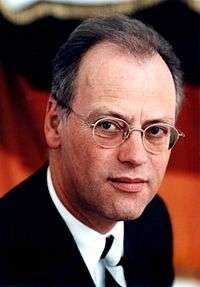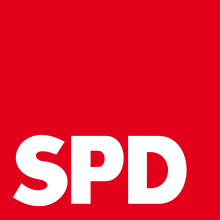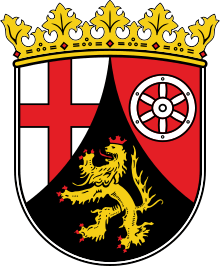Rudolf Scharping
Rudolf Albert Scharping (born 2 December 1947) is a German lawyer and politician (SPD). He was from 1991 to 1994 the 6th Minister President of the State of Rhineland-Palatinate and 1998–2002 Federal Minister of Defence in the government of Chancellor Gerhard Schröder. From 1993 to 1995 he was also the national chairman of the SPD. In the Bundestag election in 1994 he was candidate for chancellor. From March 1995 to May 2001 he served as chairman of the Party of European Socialists (PES).
Rudolf Scharping | |
|---|---|
 | |
| Federal Minister of Defence | |
| In office 27 October 1998 – 18 July 2002 | |
| Chancellor | Gerhard Schröder |
| Preceded by | Volker Rühe |
| Succeeded by | Peter Struck |
| Leader of the Social Democratic Party in the Bundestag | |
| In office 10 November 1994 – 26 October 1998 | |
| Chancellor | Helmut Kohl |
| Preceded by | Hans-Ulrich Klose |
| Succeeded by | Peter Struck |
| Leader of the Social Democratic Party | |
| In office 25 June 1993 – 18 November 1995 | |
| Preceded by | Johannes Rau (acting) |
| Succeeded by | Oskar Lafontaine |
| Minister President of Rhineland-Palatinate | |
| In office 21 May 1991 – 15 October 1994 | |
| Preceded by | Carl-Ludwig Wagner |
| Succeeded by | Kurt Beck |
| Member of the Bundestag | |
| In office 10 November 1994 – 18 October 2005 | |
| Personal details | |
| Born | Rudolf Albert Scharping 2 December 1947 Niederelbert, Allied-occupied Germany |
| Political party | Social Democratic Party (1966–present) |
| Alma mater | University of Bonn |
Early life and education
Scharping was born in Niederelbert. He studied politics, sociology and law at the University of Bonn. His master's thesis was on Social Democratic campaign techniques in Rhineland-Palatinate.[1] He speaks English.[2]
Political career
Career in state politics
Scharping joined the Social Democratic Party of Germany (SPD) in 1966. He was of the Landtag of Rhineland-Palatinate from 1975 to 1994. From 21 May 1991 to 15 October 1994, he served as Minister-President of the state.
Career in national politics
From 1993 to 1995, Scharping was chairman of the SPD, succeeding Björn Engholm. In an internal vote, he won against Gerhard Schröder und Heidemarie Wieczorek-Zeul. At the time, he was the youngest leader in the history of his party.[3] During his time in office, he sought to nudge the party toward the center ground commanded by the Christian Democrats.[4]
In the 1994 elections, Scharping ran as the SPD's candidate for Chancellor against incumbent Helmut Kohl of the Christian Democrats (CDU). By March 1994, he held a 15-point lead over Kohl in the polls.[5] As part of his campaign, he included his long-term rivals Schröder and Oskar Lafontaine in his shadow cabinet.[6] He eventually lost and became leader of the opposition; his successor for the role as Minister-President was Kurt Beck. In his capacity as chairman of the SPD parliamentary group, he also served on the Committee on the Election of Judges (Wahlausschuss), which is in charge of appointing judges to the Federal Constitutional Court of Germany.
Scharping was later defeated by Oskar Lafontaine as SPD chairman in an upset vote at the federal party convent at Mannheim. Instead, he was elected as one of five vice chairmen in the same year and re-elected in 1997, 1999 and 2001.
Minister of Defence, 1998–2002
From 27 October 1998 to 18 July 2002, Scharping served as Germany's Minister of Defence in the government of Chancellor Gerhard Schröder. During his time in office, the German Bundeswehr participated for the first time since 1945 in a War outside Germany in former Yugoslavia. Scharping defended the German involvement with the Hufeisenplan, which later turned out to have likely been a hoax. Parts of the German population doubted the compatibility of the military methods, for example the NATO bombing of Yugoslavia, with the Grundgesetz.
In 1999, Scharping established a government-appointed independent commission headed by former President Richard von Weizsäcker to develop recommendations on the reform of the Bundeswehr.[7]
By July 1999, Scharping was widely considered the leading candidate to become the new Secretary General of NATO; however, he declined to be nominated for the position.[8][9][10]
In what was later called Majorca Affair, Scharping had his picture taken in the swimming pool in company of his girlfriend Kristina Countess Pilati while the Bundeswehr was about to begin a difficult mission in Republic of Macedonia.[11] He subsequently faced an investigation in parliament in over claims that he improperly used military planes to visit Pilati in Majorca and in Frankfurt.[12]
Ahead of the 2002 elections, Schröder dismissed Scharping after weekly magazine Stern reported that he had accepted some $71,000 from a Frankfurt public relations company in 1998 and 1999, while he was minister.[13]
Following his dismissal as Minister of Defense, Scharping withdrew his candidacy for reelection as vice chairman as his chances were meagre. His successor was once again Kurt Beck. He kept his Bundestag seat but did not run again in the 2005 elections. For the remainder of his term, he served on the Committee on Foreign Affairs from 2002 until 2015.
Controversy
In 1968, the SPD expelled Scharping for a year for taking part in an antimilitary protest against a fund-raising concert for the German military band.[14]
During a visit to United States Secretary of Defense William Cohen in 2000, Scharping was injured and briefly hospitalized after a steel security barrier sprang up beneath his motorcade as it arrived for an honors ceremony at the Pentagon.[15]
In 2001, Scharping was criticized publicly by Defense Secretary Donald H. Rumsfeld when he was found to be the source of a report that the United States would intervene in Somalia as part of the campaign against terrorism.[16]
Political positions
As chairman of the SPD, Scharping spoke out against the Euro that would leave Germany with a currency weaker than the Deutsche Mark.[17]
Life after politics
Since leaving politics, Scharping established his own company with a focus on business development in China. In 2005, he became the chairman of the Bund Deutscher Radfahrer. In addition, he took on a variety of paid and unpaid positions, including as member of the board of trustees at the Bonner Akademie für Forschung und Lehre praktischer Politik (BAPP).[18]
| Wikimedia Commons has media related to Rudolf Scharping. |
References
- Craig R. Whitney (June 24, 1993), German Opposition Party Chooses a New Leader New York Times.
- Craig R. Whitney (April 10, 1994), Kohl's Challenger Is Coming on Visit to Try to Reassure U.S. New York Times.
- Craig R. Whitney (March 9, 1994), Now Breathing Down Kohl's Neck Is Big Socialist New York Times.
- Alan Cowell (November 17, 1995), Germany's Social Democrats Replace Leader With a Rival New York Times.
- Ferdinand Protzman (August 30, 1994), German Opposition Names Shadow Cabinet in Hopes of Votes New York Times.
- Ferdinand Protzman (August 30, 1994), German Opposition Names Shadow Cabinet in Hopes of Votes New York Times.
- Roger Cohen (May 24, 2000), Germans Plan To Trim Army And Rely Less On the Draft New York Times.
- Fitchett, Joseph (15 July 1999). "Paddy Ashdown of Britain Is Seen by Some As Leading Candidate for Secretary-General : Hunt for NATO Chief Moves Into New Phase". The New York Times. The New York Times Company. Retrieved 2014-04-18.
- Ulbrich, Jeffrey (16 July 1999). "Secretary-general sought by NATO". Associated Press. Retrieved 2014-04-18.
- Whitney, Craig R. (31 July 1999). "Britain Nominates Its Defense Secretary to Be Head of NATO". The New York Times. The New York Times Company. Retrieved 2014-04-18.
- 'Lustwaffe' Minister in firing line - Guardian
- Steven Erlanger (July 19, 2002), With an Eye On Election, Schröder Fires Defense Chief New York Times.
- Steven Erlanger (July 19, 2002), With an Eye On Election, Schröder Fires Defense Chief New York Times.
- Craig R. Whitney (March 9, 1994), Now Breathing Down Kohl's Neck Is Big Socialist New York Times.
- Steven Lee Myers (November 17, 1995), Pentagon Security Gate Misfires, Injuring German New York Times.
- Steven Erlanger (July 19, 2002), With an Eye On Election, Schröder Fires Defense Chief New York Times.
- Alan Cowell (November 17, 1995), Germany's Social Democrats Replace Leader With a Rival New York Times.
- Board of Trustees Bonner Akademie für Forschung und Lehre praktischer Politik (BAPP).
External links
- Extensive Biography (in German)
- Appearances on C-SPAN
| Political offices | ||
|---|---|---|
| Preceded by Carl-Ludwig Wagner |
Minister-President of Rhineland-Palatinate 1991–1994 |
Succeeded by Kurt Beck |
| Preceded by Volker Rühe |
Federal Minister of Defence (Germany) 1998–2002 |
Succeeded by Peter Struck |
| Party political offices | ||
| Preceded by Björn Engholm |
Chairman of the Social Democratic Party of Germany 1993–1995 |
Succeeded by Oskar Lafontaine |

